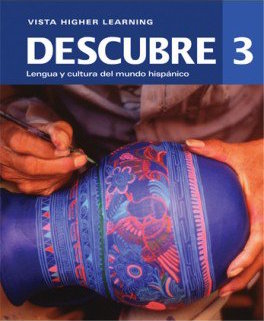
All Solutions
Page 96: Practica
The subject is a plural first person, so the correct past tense form of *hacer* is **hicimos**.
The subject is a singular third person, so the correct past tense form of *barrer* is **barrió**.
The subject is a singular first person, so the correct past tense form of *pasar* is **pasé**.
The subject is a plural third person, so the correct past tense forms of *quitar* and *volver* are **quitaron** and **volvieron**.
The subject is a singular first person, so the correct past tense form of *lavar* and *poner* are **lavé** and **puse**.
The subject is a plural first person, so the correct past tense form of *terminar* is **terminamos**.
The subject is a singular third person, so the correct past tense form of *abrir* is **abrió**.
The subject is a singular third person, so the correct past tense form of *ver* is **vio**.
The first subject is a singular third person, so the correct past tense form of *decir* is **dijo**; the second is a plural first person, so the correct form is **decidimos**.
The first subject is a singular first person, so the correct past tense form of *apagar* is **apagué**; the second is a plural first person, so the correct form is **fuimos**.
| | | | |
|–|–|–|–|
|last night | my classmate | chatted| ?|
|the day before yesterday |my brother | give|? |
|yesterday | my friends| say| ?|
|twice |my Spanish teacher |go |? |
|last week |I | read|? |
|once | | ask for|? |
| | | have to| ?|
* *Anoche, mi compañero de clase dijo que haría la tarea.*
Last night, my classmate said he’d do the homework.
* *Ayer, my hermano leyó mi diario.*
Yesterday, my brother read my diary.
* *La semana pasada, el profesor de español pidió que hiciéramos silencio.*
Last week, the Spanish teacher asked for us to be silent.
* *Anteayer, mis amigos fueron al cine.*
The day before yesterday, my friends went to the movies.
* *Una vez, yo conversé con el director de mi escuela.*
Once, I chatted with my school’s principal.
You could write:
*La última vez que hice mandados fue la semana pasada. Fui al banco a buscar papeles.*
The last time I did errands was last week. I went to the bank to pick up some papers.
You could write:
*La última vez que dije una mentira fue ayer. Dije que había limpiado mi cuarto, pero no lo había hecho.*
The last time I told a lie was yesterday. I said I had cleaned my room, but I hadn’t.
You could write:
*La última vez que anduve atrasado fue anteayer. Llegué media hora tarde a clase porque se retrasó el autobus.*
The last time I was late was the day before yesterday. I was half an hour late to class because the bus was late.
You could write:
*La última vez que olvidé algo importante fue en octubre. Olvidé el cumpleaños de mi tío.*
The last time I forgot something important was in October. I forgot my uncle’s birthday.
You could write:
*La última vez que devolví un regalo fue cuando tenía trece años. Devolví una camisa porque no me entraba.*
The last time I returned a gift was when I was thirteen years old. I returned a shirt because it didn’t fit me.
You could write:
*La última vez que fui de compras fue hace un mes. Compré un par de zapatos y una camisa.*
The last time I went shopping was a month ago. I bought a pair of shoes and a shirt.
You could write:
*La última vez que oí una mala noticia fue esta semana. Oí que se había roto un caño en mi casa.*
The last time I heard bad news was this week. I heard that a pipe had broken at my house.
You could write:
*La última vez que encontré una ganga increíble fue ayer. Encontré anteojos de sol muy baratos.*
The last time I found an amazing offer was yesterday. I found very cheap sunglasses.
You could write:
*La última vez que me probé ropa en una tienda fue hace un mes. Me probé un vestido.*
The last time I tried clothes on at a store was a month ago. I tried on a dress.
You could write:
*La última vez que compré algo muy caro fue en julio. Compré entradas para un concierto.*
The last time I bought something very expensive was in July. I bought tickets for a concert.

